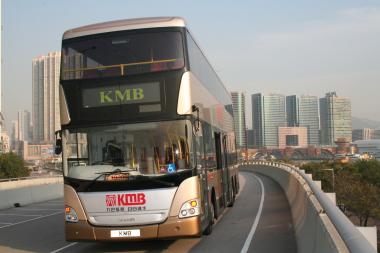 First published: March 17, 2010
First published: March 17, 2010
Source: Hong Kong Government, via 7th Space
Following is a question by Hon Kam Nai-wai and a written reply by the Secretary for the Environment, Mr Edward Yau, in the Legislative Council today (March 17): Question: Regarding the reduction in the emissions from franchised buses and the resultant pollution problems, will the Government inform this Council: (a) of the current number of buses in each of the bus fleets of franchised bus companies, with a breakdown by the emission standard met by the buses; (b) of the number of old buses replaced by each franchised bus company in the past five years, the replacement cost per bus and the total replacement costs involved; how these figures compare with the corresponding estimated figures in the next five years; whether it knows if such companies have finalised their respective bus replacement timetables for the next five years; if the timetables have been finalised, of the details; if the timetables have not been finalised, the reasons for that; and (c) whether it has studied and estimated the losses suffered and social costs borne by Hong Kong as a result of the pollution problems caused by emissions from franchised buses; if so, of the details; if not, the reasons for that; and what solutions the Government has to reduce the losses and costs in this regard?
Reply : President, (a) Number of buses owned by the franchised bus companies as at end December 2009, classified by emission standard, is shown at Annex I. (b) Number of new buses purchased and old buses retired by the franchised bus companies between 2005 and 2009 is at Annex II.
Currently, a new double-deck bus and a new single-deck bus costs about $3 million and $2 million respectively. The total procurement cost of new buses depends on the number and type of buses purchased by individual bus companies. All franchised bus companies are required to operate their franchised bus services with buses under the age of 18, and have been replacing their serving buses accordingly. It is expected that more than 40% of the existing franchised buses will be retired by 2015. Franchised bus companies have to submit annually to the Transport Department (TD) their Forward Planning Programmes for the next five years, including programmes for purchasing new buses and retirement of old buses. Since TD is in the process of consulting the relevant District Councils on the Route Development Programmes (RDPs) submitted by the franchised bus companies, further discussions with the bus companies and adjustments to the RDP may be required. In addition, the bus companies also have to consider other relevant factors. As such, the number of buses that will be purchased and retired by individual bus companies in the next five years cannot be provided at this stage.
(c) According to the Air Quality Objectives Review Study, if all pre-Euro, Euro I and Euro II commercial vehicles including franchised buses were retired, the economic benefit (including the reduction in costs of medication, consultations, hospital admissions, and loss of earnings due to the receptors’ work absenteeism, etc.) to be brought about by this proposed measure would be about $24,300 million. However, we do not have the estimated figures solely for retiring franchised buses. In order to promote wider use of environment friendly buses, the Government has added a requirement in all franchises with the bus companies that when setting specifications for acquisition of new buses, they are required to adopt the latest commercially available and proven environmental technologies. We have also been working with the franchised bus companies on deploying more environment friendly buses to serve the busy corridors. As at December 2009, all franchised buses plying through Yee Wo Street, over 92% of the franchised buses plying through Hennessy Road and Nathan Road, and over 83% of the franchised buses plying through Queensway and Des Voeux Road Central already met Euro II or above emission standards. Moreover, the Transport Department has been working with the franchised bus companies to pursue route cancellations, amalgamations, truncations and frequency reductions to reduce the number of buses on road, especially those plying through the busy corridors, in order to improve road traffic and the environment. Based on the age distribution of the existing franchised buses, it is anticipated that all the pre-Euro and Euro I buses will retire by 2012 and 2015 respectively or earlier, while Euro II buses will retire by 2019 or earlier.
We have also been discussing with the bus companies to explore various options to reduce the emissions of franchised buses, which include accelerated replacement of old buses, bus route rationalisation, setting up of low emission zones, and assessing the feasibility of retrofitting selective catalytic reduction (SCR) devices onto Euro II and III buses to reduce their NOx emissions, etc. Furthermore, the Financial Secretary has proposed in his recent Budget Speech to set up a $300 million Pilot Green Transport Fund for application initially by public transport operators, including bus companies, to try out green transport technologies to reduce roadside pollution.